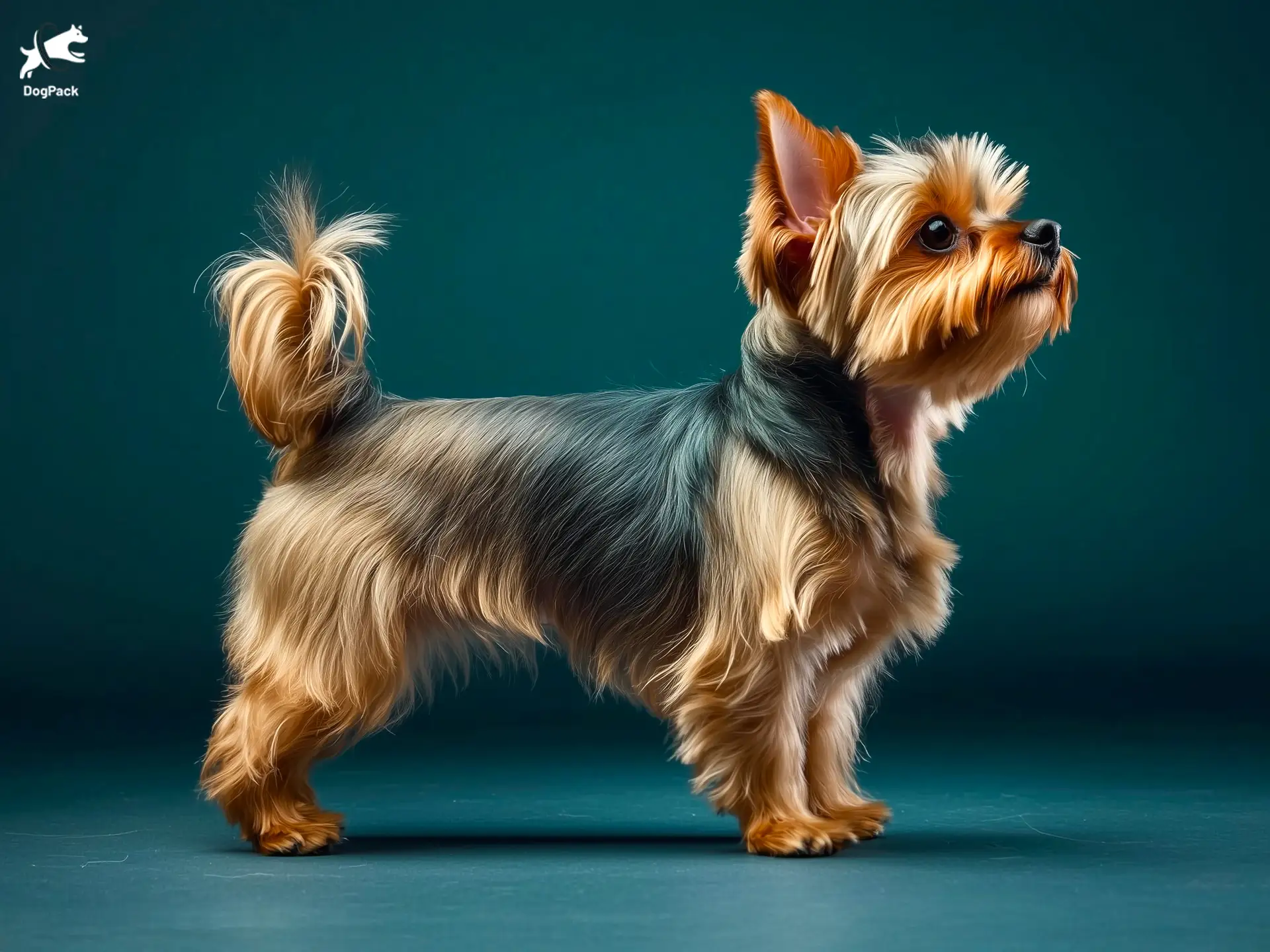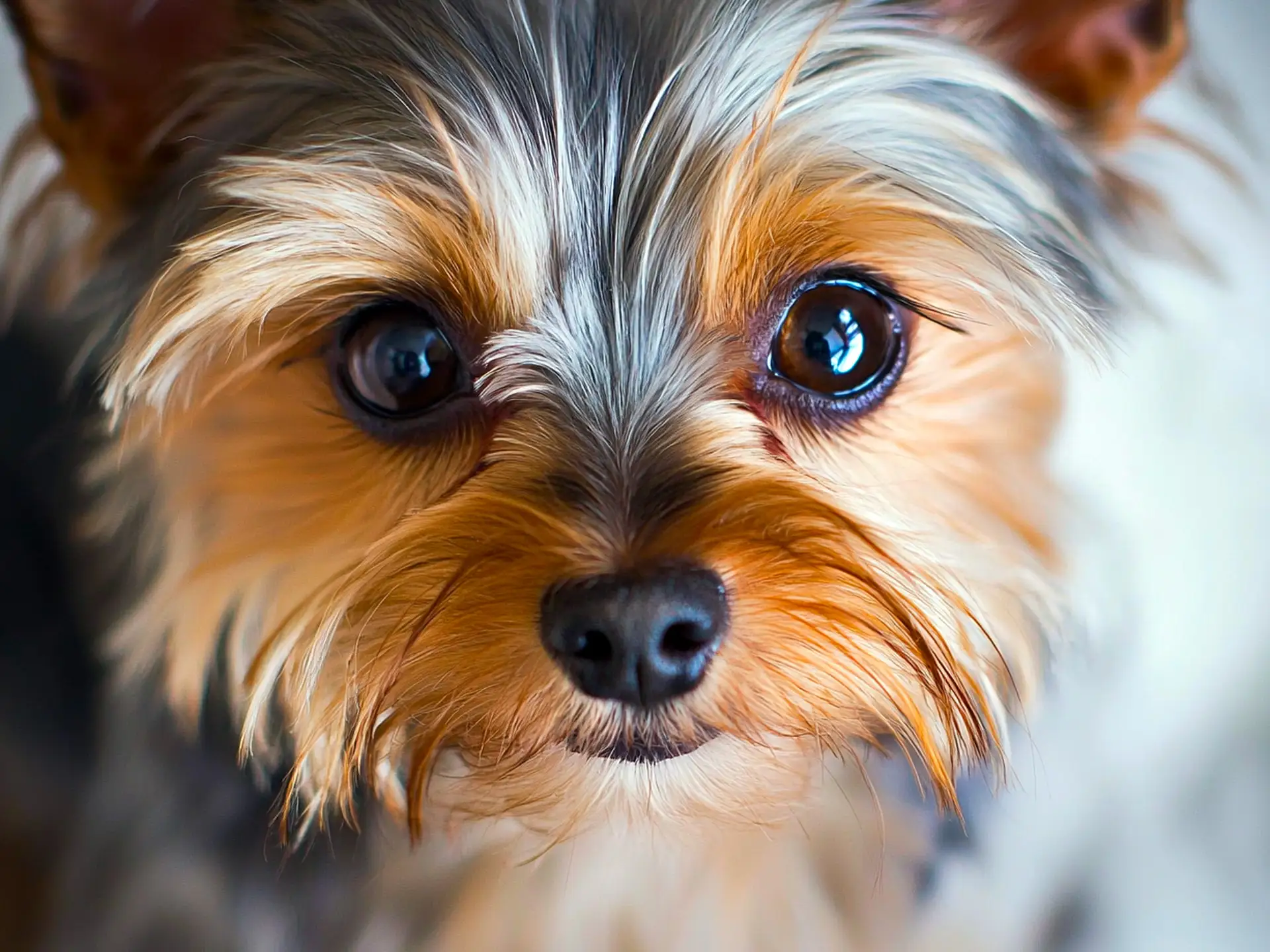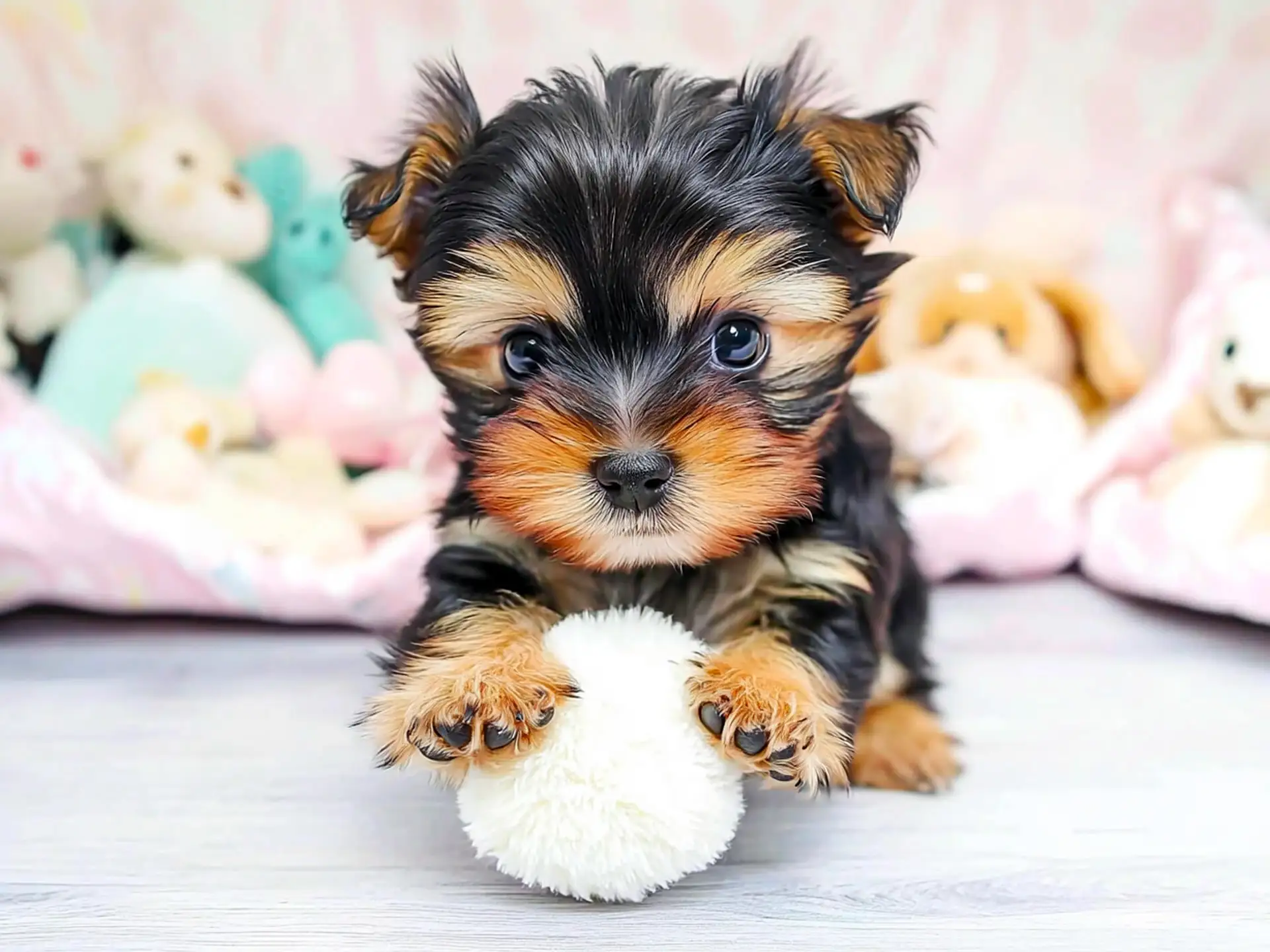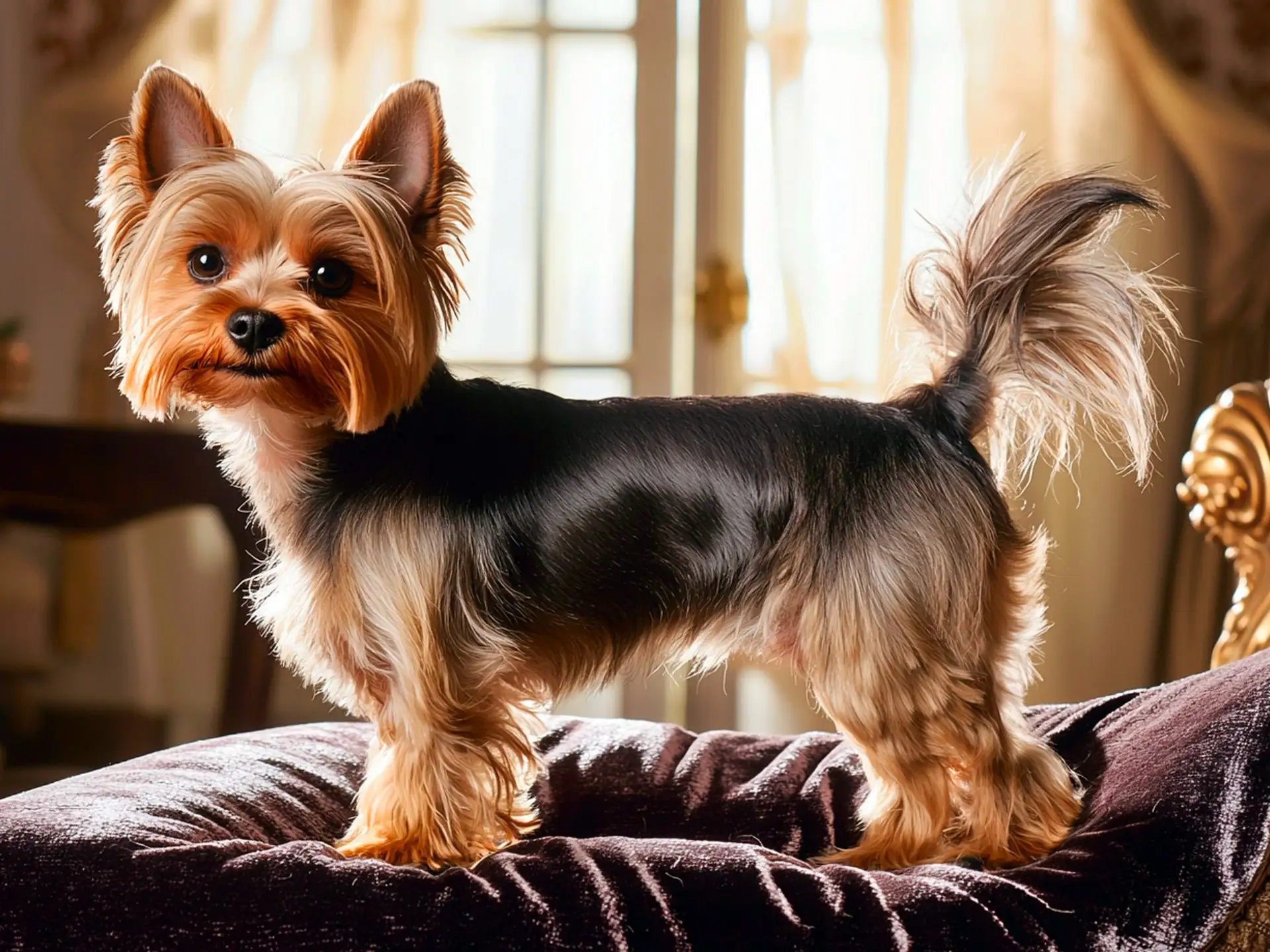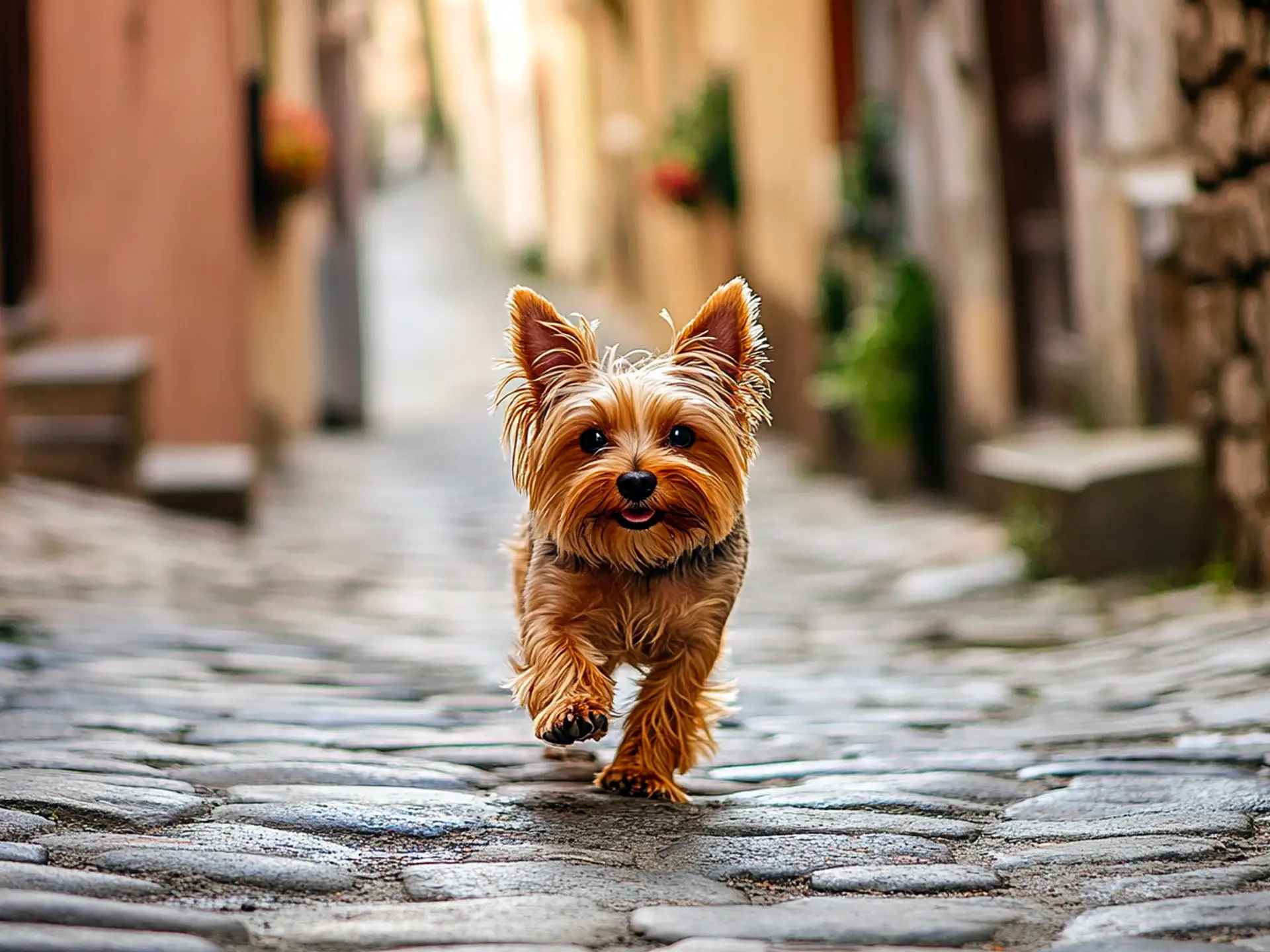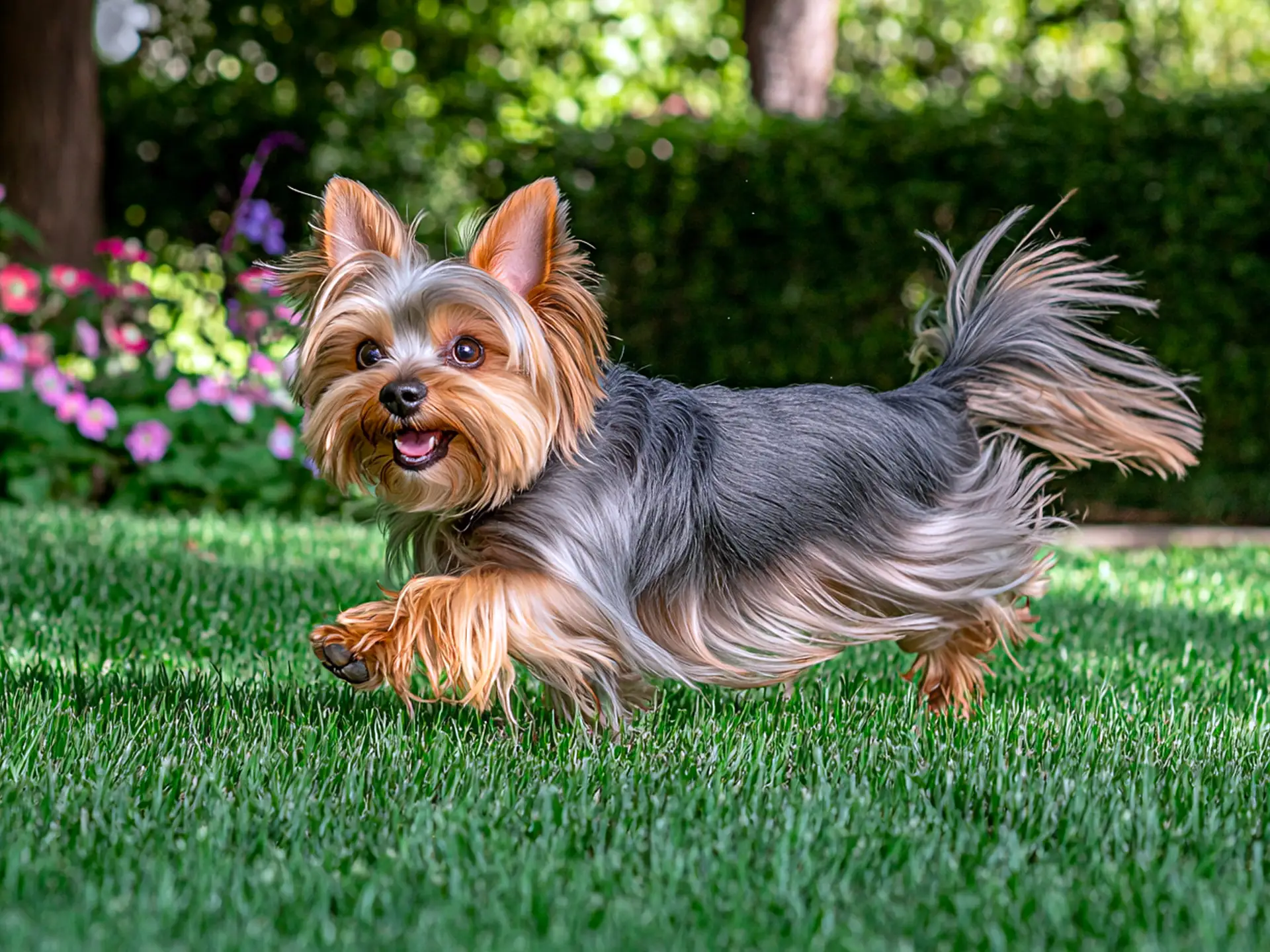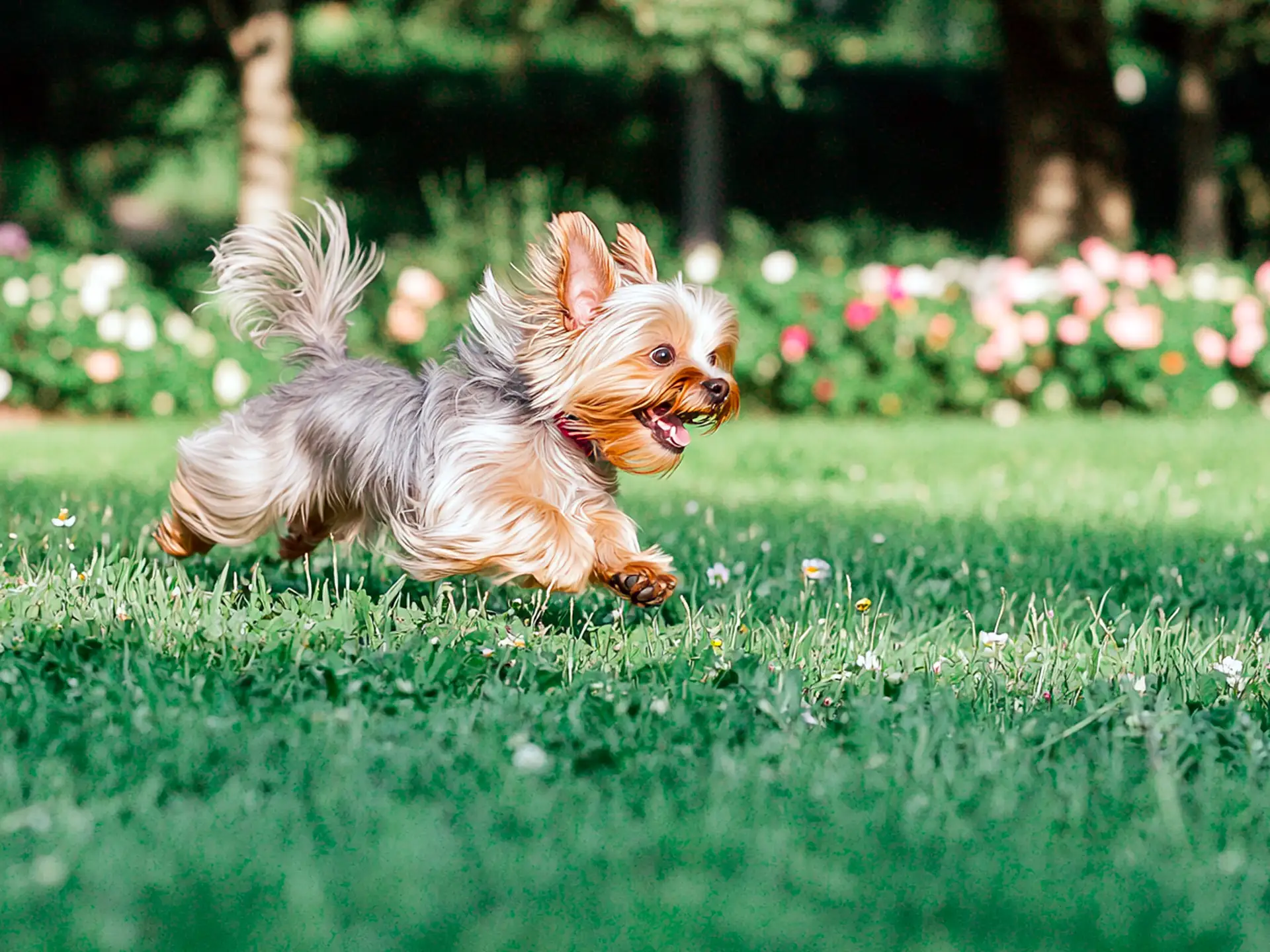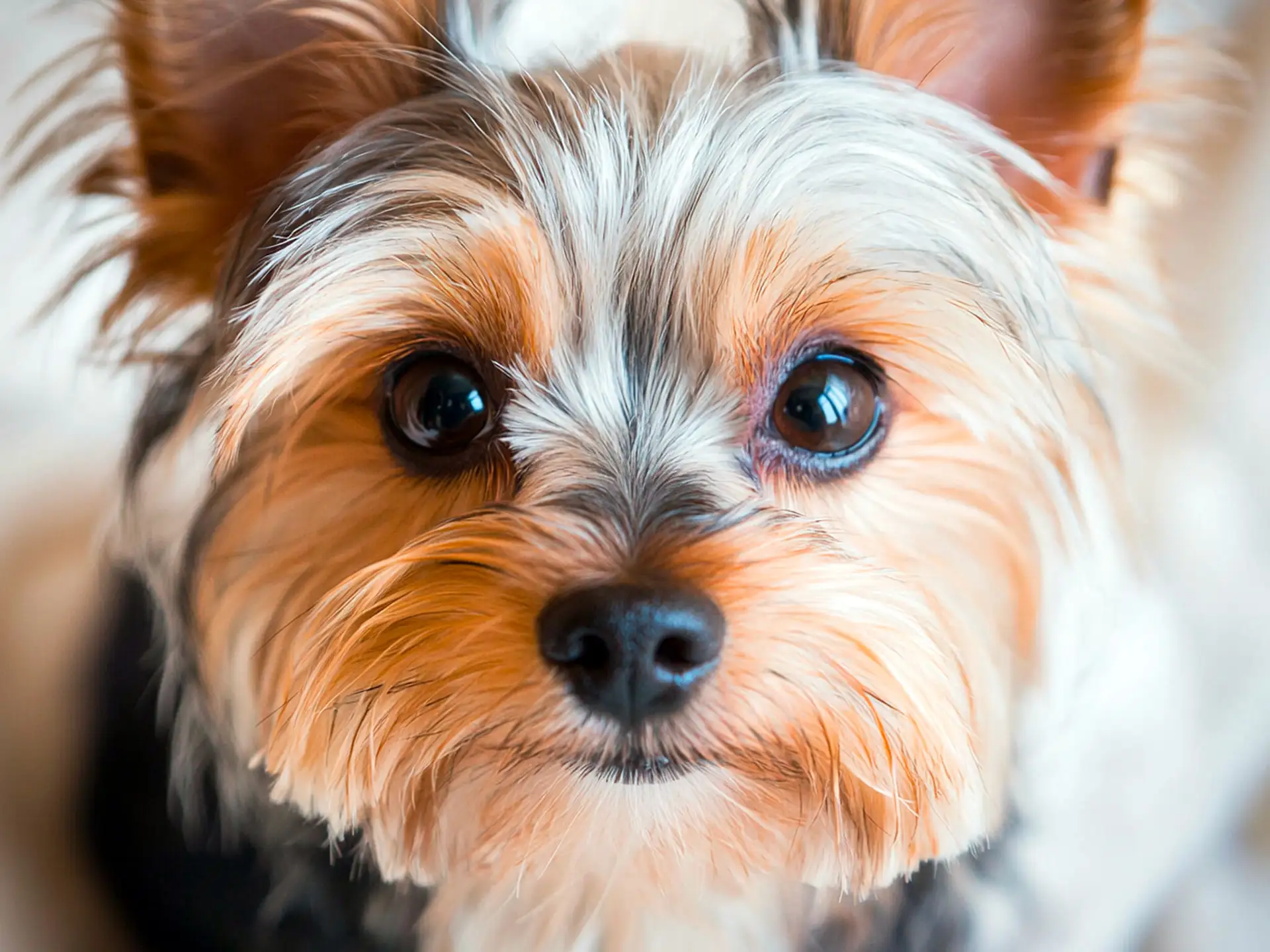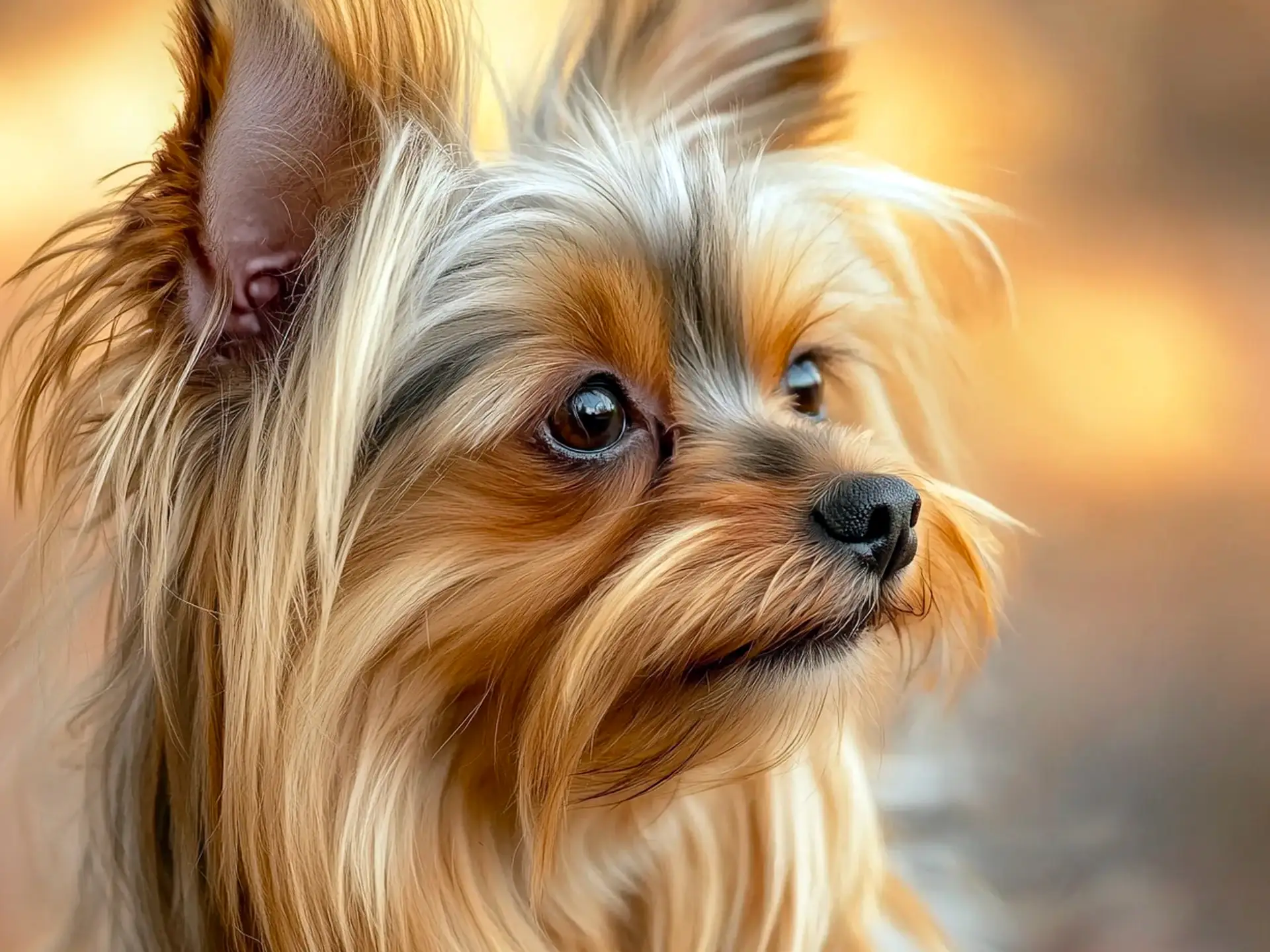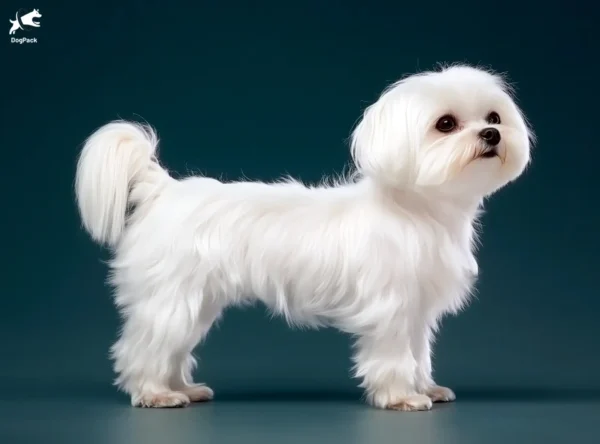Yorkshire Terrier Dog Breed Info & Overview
The Yorkshire Terrier, or Yorkie, proves that big personalities come in small packages. This tiny breed is bursting with spunk, affection, and a bold demeanor that belies their petite size. Known for their luxurious silky coats and lively nature, Yorkies are perfect companions for those who want a devoted and energetic dog in a compact, portable form.
Characteristics
Pictures
Breed History
The Yorkshire Terrier’s origins trace back to the 19th century in northern England, where working-class families bred these tiny but fearless dogs to control rodent populations in textile mills and coal mines. Their lineage is believed to include the Waterside Terrier, Paisley Terrier, and other small terrier breeds brought by Scottish workers migrating to Yorkshire.
Despite their modest beginnings as working dogs, Yorkies quickly charmed their way into aristocratic circles. Their diminutive size, elegance, and spirited nature made them ideal companions for the English elite. By the late 1800s, the Yorkshire Terrier transitioned from a blue-collar ratter to a fashionable lapdog.
Recognized by the British Kennel Club in 1886, their popularity spread internationally, with their fame skyrocketing in the United States. Today, Yorkshire Terriers are one of the most beloved toy breeds, known for their unique blend of charm, courage, and style.
Temperament, Personality
Yorkshire Terriers may be small, but their personalities are larger than life. Confident and feisty, these little dogs embody the classic terrier spirit, often acting oblivious to their petite stature. They’re affectionate with their families and thrive on attention, making them devoted companions.
Yorkies adore being involved in household activities and often follow their owners around like shadows. They’re playful and enjoy cuddles, but their delicate frames mean supervision is crucial around young children who may not understand how to handle them gently.
Early socialization is essential for Yorkies. They can be territorial and bold, especially when interacting with larger dogs or strangers. However, with proper training and exposure, their innate friendliness shines through, and they become delightful little watchdogs that alert you to visitors or unusual noises.
Physical Characteristics
Yorkshire Terriers are renowned for their striking, silky coat, which cascades down their small frames in a straight, luxurious flow. Their steel-blue and tan coloration, combined with their well-proportioned bodies, gives them an air of refinement that’s hard to ignore.
Standing about 7–8 inches tall and weighing no more than 7 pounds, Yorkies are among the smallest dog breeds. Despite their size, they carry themselves with confidence and an undeniable swagger that captures attention wherever they go.
Their expressive faces, framed by perky, V-shaped ears and sparkling dark eyes, exude intelligence and curiosity. Whether sporting a full-length show coat or a practical “puppy cut,” Yorkies manage to charm with their appearance alone.
Health Issues
Yorkshire Terriers are generally healthy but can face certain breed-specific health challenges. Dental problems are common due to their small mouths, making regular teeth brushing and dental cleanings essential to prevent plaque buildup and periodontal disease.
Luxating patellas, or dislocated kneecaps, are another concern. Avoiding excessive jumping can help reduce stress on their joints. Additionally, Yorkies are prone to tracheal collapse, where the windpipe becomes weakened. Using a harness instead of a collar during walks can minimize strain on their sensitive necks.
Eye conditions such as cataracts and progressive retinal atrophy (PRA) can develop as they age. Routine veterinary check-ups and early detection are vital for managing these potential issues, ensuring your Yorkie stays healthy and happy.
Grooming Needs
Yorkshire Terriers require regular grooming to maintain their silky coats in top condition. If kept long, their hair needs daily brushing to prevent tangles and matting. A pin brush is ideal for their fine, flowing locks. For easier upkeep, many owners opt for a short “puppy cut,” which requires less maintenance.
Bathing every two to three weeks keeps their coat clean and shiny, but always use a gentle dog shampoo to avoid skin irritation. After bathing, ensure their coat is thoroughly dried to prevent chills, as Yorkies are sensitive to cold temperatures.
Don’t neglect their nails, teeth, and ears. Trim their nails regularly, brush their teeth daily to combat plaque, and check their ears weekly for signs of infection. Grooming sessions can double as bonding time, strengthening the relationship between you and your pup.
Exercise Requirements
While Yorkshire Terriers are small, they have plenty of energy to burn. A daily 30-minute walk is usually enough to satisfy their exercise needs. They also love interactive play sessions, so games like fetch or tug-of-war are great ways to keep them active and engaged.
Despite their size, Yorkies have a terrier’s instinct for chasing. Secure off-leash play areas are a must to prevent them from darting after squirrels or birds. Puzzle toys or obedience training can provide additional mental stimulation, helping to prevent boredom.
Be mindful of extreme temperatures during outdoor activities. Their small size and delicate nature make them susceptible to both cold and heat, so indoor play might be a better option in harsh weather.
Training Tips
Training a Yorkshire Terrier can be both fun and challenging. They are intelligent and eager to please but can also be headstrong. Positive reinforcement with treats, praise, and play works best to motivate them.
Consistency and patience are key, especially during housebreaking. Due to their small bladder size, accidents may happen, so a regular potty schedule and crate training can help establish good habits. Be sure to celebrate their successes with plenty of encouragement.
Early socialization is critical to curb excessive barking or territorial behavior. Exposing your Yorkie to various environments, people, and other pets will help them grow into a confident and well-mannered companion.
Nutrition, Diet
Yorkshire Terriers have specific dietary needs due to their small size and fast metabolism. High-quality dry kibble formulated for toy breeds is ideal, providing the right balance of nutrients in a manageable size for their tiny mouths.
Feed your Yorkie in small, frequent meals to prevent hypoglycemia, especially when they’re puppies. An adult Yorkie typically eats 1/2 to 3/4 cup of food per day, divided into two meals. Monitor their weight closely to avoid overfeeding, as obesity can exacerbate joint and respiratory issues.
Supplementing their diet with omega-3 fatty acids can promote a shiny coat and healthy skin. Always consult your veterinarian to ensure their diet meets their unique nutritional requirements.
Adoption, Breeders
If you’re considering a Yorkshire Terrier, finding a reputable breeder is essential. The Yorkshire Terrier Club of America provides a list of certified breeders who prioritize health and temperament. Always ask for health clearances and meet the puppy’s parents to gauge their behavior and condition.
Adopting a Yorkie is another wonderful option. Organizations like Yorkshire Terrier National Rescue work to rehome Yorkies in need of loving families. Many adult Yorkies in rescue are already trained and make excellent companions.
Avoid puppy mills or pet stores, which often prioritize profit over the dogs’ wellbeing. Taking the time to research breeders or rescue groups ensures you’ll bring home a healthy and well-adjusted new family member.
Family Pet?
Yorkshire Terriers are wonderful family pets for households that can meet their needs. They’re affectionate, loyal, and thrive on companionship. While they adore older children who know how to handle them gently, their small size makes them vulnerable to accidental injury from rough play.
They can coexist peacefully with other pets if introduced early, though their bold terrier nature might make them bossy. Supervision during interactions with larger animals is recommended to ensure everyone gets along safely.
Yorkies crave attention and prefer to be involved in daily family life. They’re ideal for homes where someone is often around to provide companionship, as they don’t enjoy being left alone for long periods.
Right For You?
If you’re looking for a small, spirited dog that’s full of personality, the Yorkshire Terrier could be your perfect match. They’re best suited for individuals or families who can dedicate time to grooming, training, and companionship.
Yorkies adapt well to apartment living but still need daily exercise and mental stimulation. They might not be the best fit for families with very young children or those who are away from home frequently.
With proper care and attention, Yorkshire Terriers reward their owners with endless love and entertainment. If you’re ready for the commitment, this tiny dog with a big heart will become an unforgettable part of your life.
Conclusion
The Yorkshire Terrier is a delightful combination of elegance, intelligence, and feistiness. Their devoted nature makes them an excellent companion for those willing to meet their grooming and attention needs. Whether you’re looking for a loyal lapdog or an energetic playmate, the Yorkie’s charm and personality will win you over. If you’re ready to welcome this vivacious little dog into your life, the Yorkshire Terrier might just be your perfect fit.
FAQs
-
What makes a Yorkshire Terrier’s coat unique compared to other breeds?
Unlike most dogs, a Yorkshire Terrier’s coat is similar to human hair, growing continuously without seasonal shedding. This unique trait requires regular trims and brushing to prevent tangles and maintain its silky texture.
-
Do Yorkshire Terriers enjoy being carried around?
While Yorkshire Terriers are small and portable, they prefer a balance of carrying and walking. They are active dogs who enjoy exploring their surroundings and benefit from daily walks to meet their exercise needs.
-
Can Yorkshire Terriers adapt to outdoor living?
Yorkshire Terriers are not suited for outdoor living. Their small size and fine coat make them vulnerable to temperature extremes, so they should be kept indoors as beloved companions.
-
Are Yorkshire Terriers good for homes with children?
Yorkshire Terriers can be good with older, gentle children but may not tolerate rough handling from younger kids. Teaching children how to interact respectfully ensures a safe and happy relationship.
-
What kind of activities do Yorkshire Terriers enjoy?
Yorkshire Terriers love interactive play, such as fetch or tug-of-war, and mental stimulation through puzzle toys. Despite their size, they are surprisingly energetic and enjoy agility or obedience training.
Breed Ratings
Yorkshire Terriers are smart and quick learners but may show a stubborn streak during training.
This breed is highly playful and enjoys engaging with their owners in games and activities.
Yorkies have moderate energy levels, needing daily walks and interactive play to stay content.
Shedding is minimal due to their hair-like coats, making them low shedders.
Their terrier background gives them a strong prey drive; they may chase small animals.
Grooming needs are high; regular brushing and professional grooming are necessary.
They can be trained with patience and consistency, responding well to positive reinforcement.
Yorkies prefer company and may develop separation anxiety if left alone too long.
They tend to bark frequently, serving as good watchdogs but may need training to control.
Drooling is minimal, making them a tidy breed in this aspect.
With proper socialization, they can get along with other dogs but may assert dominance.
Generally healthy but prone to certain breed-specific conditions requiring regular vet care.

